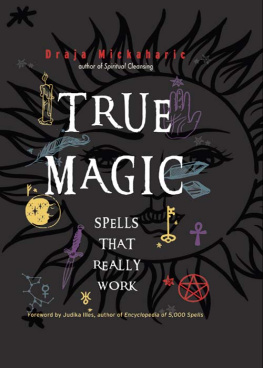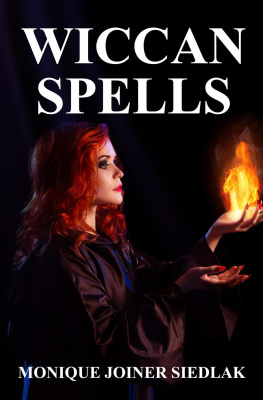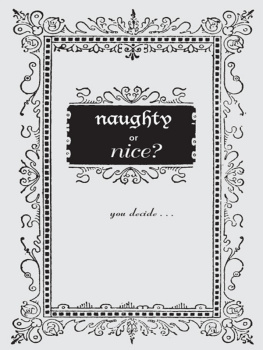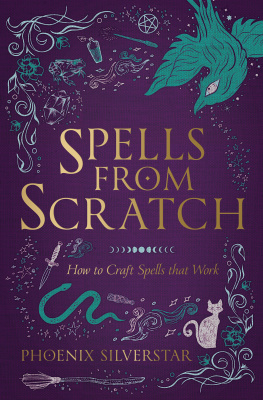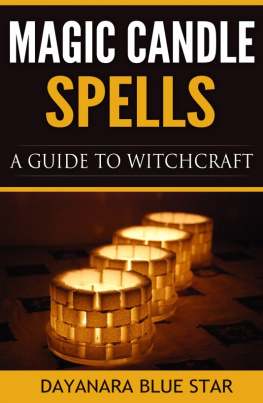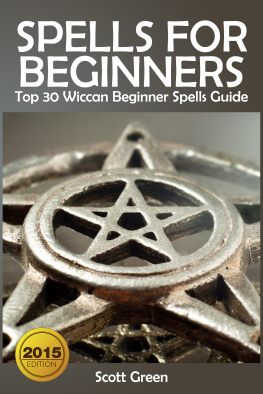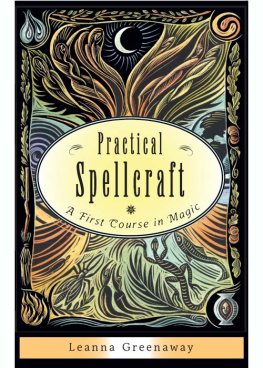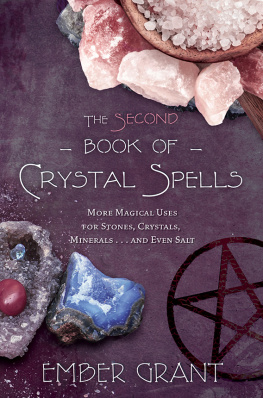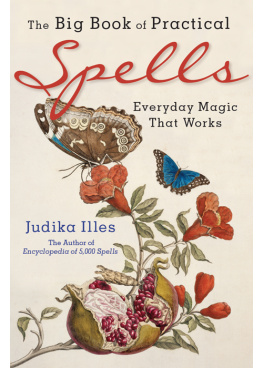

Omnisciently
humanity requires
so simple a task
as to fulfill desires

This edition first published in 2019 by Weiser Books, an imprint of
Red Wheel/Weiser, LLC
With offices at:
65 Parker Street, Suite 7
Newburyport, MA 01950
www.redwheelweiser.com
Copyright 1988, 1990, 2019 by Draja Mickaharic
Foreword copyright 2019 by Judika Illes
All rights reserved. No part of this publication may be reproduced or transmitted in any form or by any means, electronic or mechanical, including photocopying, recording, or by any information storage and retrieval system, without permission in writing from Red Wheel/Weiser, LLC.
Reviewers may quote brief passages.
Previously published in 1990 as A Century of Spells ISBN: 978-0-87728-647-9.
This book contains material on spells that are potentially dangerous. Readers using the information in this book do so entirely at their own risk, and the author and publisher accept no liability if adverse effects are caused.
ISBN: 978-1-57863-660-0
Library of Congress Cataloging-in-Publication Data available upon request.
Cover design by Kathryn Sky-Peck
Interior by Kasandra Cook, Typeset in Centaur
Printed in the United States of America
LB
10 9 8 7 6 5 4 3 2 1
www.redwheelweiser.com/newsletter
CONTENTS
FOREWORD
The study of magic is really a course in self-development
of a particular nature.
Draja Mickaharic
Particular nature, indeed. Until the end of the 20th century, the art of spell-casting was only taught in the shadows and for good reason. At best, it was disreputable to be identified as a practitioner of magic and, at worst, it was dangerous. Witch-hunting is not ancient history. Anna Gldi, the woman usually identified as the last to be convicted and executed for practicing witchcraft in Europe, was beheaded in 1782, not that very long ago. Even as I write, those identified as witches are persecuted in many parts of the world.
Until even more recentlythe early years of the 21st centuryfolk magic was the most disreputable and disrespected of the magical arts. Ceremonial magic, also known as high ritual magic, practiced largely by educated menmagic for the initiated elitebore a certain, dangerous glamour. Folk magic, on the other hand, was commonly called low magic with all negative implications intended.
Folk magic is exactly what its name says: the magic of the folk. My folks, your folks, everyone's folks. As such, it is an extremely fluid and personal genre. Your folk magic is a reflection of your history, your ancestry, where you've lived, what you've read, who you've met, and what you've experienced. It's what's been taught to you and what you've picked up for yourself. In these days of the internet and social media, folk magic busts right through boundaries of space and linguistics. Once upon a time, however, folk magic was likely to be what you learned from your older, female relatives. Perhaps because folk magic was so identified with womenanother name for it is Granny Magicand perceived as the province of the poor and uneducated, it's long been subject to mockery and ridicule. I like to think that my own spell books, published in the first decade of the new century, had something to do with the respect now finally paid to folk magic.
Before the modern renaissance of folk magic, however, there was Draja Mickaharic, who first began publishing books on the topic in the 1980s. A Bosnian witch doctor transplanted to America, he embraced world magic and the wisdom of diverse cultures and traditions ranging from the Pennsylvania Pow-Wows to southern American Hoodoo. Mickaharic is an old master and he teaches his truth as it was taught to him many decades ago. His focus is on practical hands-on magical instruction. He was elderly, even in the 1980s, and you may find some of his language to be archaic. Readers of my own books know very well how I feel about the term black magic: No color is inherently superior or more dangerous or evil than another. The ancient Egyptians called their county Kemet, meaning the black land, as for them that color epitomized fertility, prosperity, and securityall the good things in life.
The word Kemet is at the root of another magical word, alchemy, referring to the art and science of transmutation. The finest alchemists were renowned for their ability to transform (transmute) base metals into gold, but this may be understood metaphorically. Spell-casting exists to help you achieve your goals on very practical levels. (You'll know a money spell is successful when the cash is in hand, for example.) But spell-casting is also an alchemical process intended to help you achieve your transformation into your best, most powerful self. By casting spells, honing your craft, and good old trial and error, you will uncover your own unique personal magical power. As Draja writes in this book, The magician's primary instrument is him- or herself. The development of your own natural abilities is the first step in any form of magical training.
Remember: magic is the primordial human art and its practice is our human heritage. This book is a compendium of international folk magic spells, many old, tried, and true. A spell is always intended to improve your life. Follow the formulas as written or adapt and tweak them to suit your own personal and spiritual needs, whatever is best for you. The most exciting part of spell-casting is discovering and honing your own inner powers. I wish you many hours of happy, successful spelling.
Judika Illes, author of Encyclopedia of 5000 Spells, The Big Book of Practical Spells, and other books devoted to the magical arts
PREFACE
This book is a practical introduction to natural magic. It may be considered a textbook, or, better, a workbook. You can learn natural magic from working through this book as much as it is possible to learn magic from any text. The book is also intended to be useful as a reference work for the practicing magician.
This book contains examples of many different types of spells, along with examples of spells from a number of different magical practices. It will give you an overview of the field of natural magic so you can decide whether or not you wish to pursue the study of magic. At all times, my intent has been to clearly explain the advantages and limitations of the magical art.
The development of magical abilities is the result of the spiritualization of the human soul. The closer we grow to our creator, the greater our abilities and perceptions of the divine reality. It is this divine reality that is the true reality our physical universe imperfectly reflects.
Those who have refined their senses by harmonizing them with the divine reality can see interconnections between otherwise unrelated things. The ability to sense this interconnection forms the basis for all magical operations. Those who are true adepts have developed their moral and ethical senses along with their magical powers. They do not display their abilities randomly or in a negative manner.
True magic always has a physical result on the earth. It does not end in dreams, delusions, and self-deception. True magic is a natural ability that is developed as a result of spiritual growth. It is never the product of a search for power or privilege.
Next page
